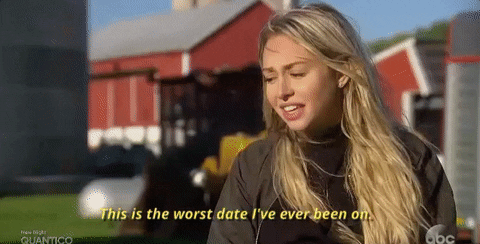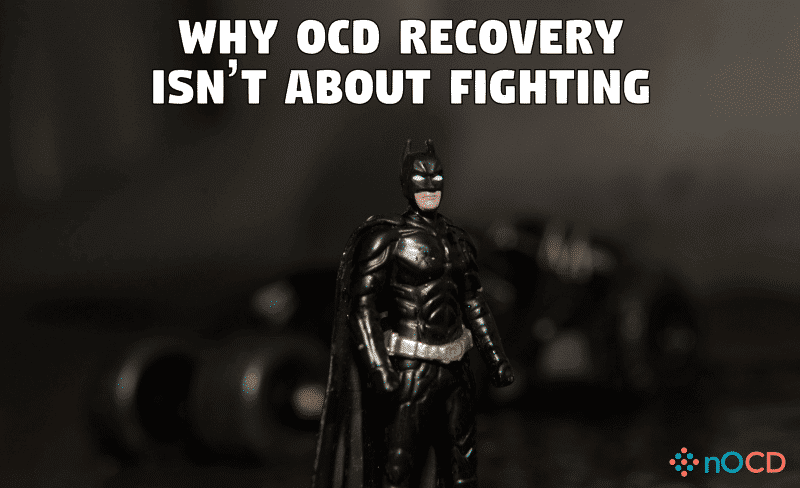Having obsessive-compulsive disorder can be pretty tough. For some people, it becomes so severe that it can shut down their lives completely. So it makes sense that many of us are extremely focused on getting better. But is there a point at which this focus becomes fixation, and we start to see everything that happens in our lives as just another manifestation of OCD?
A survey of related posts on social media– including, ahem, a few of our own– shows you what people tend to associate with OCD. Here’s a small sample of the phrases I found in recent Facebook, Twitter, and Instagram posts:
fighting
battling
always worrying
constant worry
constant struggle
just as hard as physical illness
other people have no idea
I can guarantee you that you don’t have OCD
I am a fighter battling an invisible illness
Along with the misinformed jokes that we all know aren’t helpful and a handful of genuinely helpful posts, this is the same stuff that’s on social media every single day. Even though social media isn’t representative of everybody, it’s the best non-academic sample we have. And it might tell us something interesting about the way many people with OCD view their own mental health.
Nothing to prove: getting the OCD label
A few years ago, I was searching online for something to help me understand OCD. Instagram wasn’t a big deal yet, but I was on Facebook and Twitter. I don’t remember looking in these places though, because to me they seemed like the last place I’d want to find OCD content. It might be unreliable, it wouldn’t be private, and I simply wanted to keep these places separate from mental health concerns because I saw them as places to talk with friends and look at photos. I didn’t want OCD to dig into every part of my life; the more things I had in my life that were completely free of it, the better.
I tried to learn from experts by going to therapy and reading books. I did a few sessions of group therapy, but I sensed a very dark form of cynicism underlying the things many people said in those groups. The gist seemed to be: we are the people who have really gone through it because of our OCD, and because of this curse we’re uniquely qualified to tear apart everyone and everything else.
Toward both of these things– the online sharing and the aggressive cynicism– I felt a certain amount of empathy. I was just beginning to see some really painful and destructive things in my own life as the result of having OCD, and it didn’t take long to start hating the fact that I was spending my time in high school stuck in these obsessive-compulsive cycles while my friends seemed to worry only a “normal” amount. They worried when they had an exam coming up, when a family member was sick, or when they had hatched a plan to ask someone on a candlelit date to the local Steak & Shake.

My anxiety had detached from the things people were supposed to worry about, filling most of my time with a dread that didn’t make sense– to me or anyone else. But although other people would’ve told you that I was intense or liked to brood or something like that, they probably wouldn’t have seen me as anxious. That’s either because I hid things convincingly, or because I really did experience the anxiety as a kind of darkness that existed in life and had to be dealt with.
Although I always wanted to feel better, and worked hard to make that happen, I never really saw the OCD symptoms as something outside of me, or something to fight. I was only 17 at that point, but I had made changes in lots of different areas– sleeping a bit more (but never enough), eating better, learning to deal with big social gatherings even though they overwhelmed me, and so on. The OCD felt like part of me, albeit a sort of unfortunate part, and I didn’t see why getting this part to feel better would be any different from the other changes I had made. It wasn’t a fight, a battle, or a quest to convince everyone else that they just didn’t get it. But it would be a never-ending process, often tiring and frustrating, to learn what would help me get closer to the things I really cared about.
What’s the problem with fighting?
A few years on, I think I was right in some ways and wrong in many others. The main point has stuck with me: all of these things that we call symptoms and group into OCD are part of me, and part of my experience. They originate in my brain, and have an impact all throughout my body. I don’t enjoy it (who would?), but I also don’t believe that adopting a mentality of constantly fighting so hard to banish part of yourself is ultimately going to do much good for you. This aggression directed at your own mind is more likely to alienate you from yourself– and distance you from things that might help– and keep you stuck right where you are, day after day, frustrated at other people for failing to understand.

This doesn’t mean you’ll just lie back and let yourself feel bad. But by respecting this part of your brain (and body) that feels a constant need for certainty, and becoming curious about how you might be able to live without that certainty, you’ll begin to see a life beyond the patterns your OCD symptoms have forced you to live within. It does take determination, grit, and sometimes even frustration with all the troubles you’ve gone through. It also requires very concrete changes, repeated every day until they’re fully part of your life. These might be any combination of therapy, medication, exercise, diet modification, sleep changes, and so on.
However, it doesn’t require constantly trying to convince other people that our lives are harder than theirs. There are countless variables that can make life more or less difficult, and it’s all way too complex to boil down into OCD vs. not OCD. It’s also not a competition to see who has it hardest. So talk to anyone who is willing to listen, and find the people who help you feel less alone. But if someone doesn’t want to understand your experience, you can’t make them. Don’t add to your pain by trying.

What works instead?
Besides the self-distancing that might occur with the warrior mentality and the unending frustration that can result when you try to convince absolutely everyone that they should not only understand but also respect your experience with OCD, there’s another compelling reason to take a more balanced, holistic approach.
Even once the OCD symptoms let up, life isn’t easy. (Of course you already know this, but I’m just trying to make a point.) You’ll want to use the same stuff that you worked so hard to develop while dealing with OCD: curiosity, creativity, determination, flexibility, self-awareness, self-care. So you might as well work on developing those things while the OCD is flaring up.
You can view OCD recovery as a fight or a battle or a constant struggle, just like you can view your life in this way. But, in my experience, it’s going to keep you stuck right where you are. Respect yourself, avoid suffering more than you already do, and build the skills you’ll need anyways throughout your life. You don’t have to be a warrior to feel determined about getting better. If that concept really helps you, keep it around. If it’s just making you feel more trapped or more aggressive, ditch it. Keep the things that serve you well; leave the rest behind.
If you’re interested in learning more about the NOCD app, a platform for treating your OCD and finding a community of other people dealing with anxiety disorders, check out our website.
And if you or someone you know is struggling with OCD, you can schedule a free call today with the NOCD clinical team to learn more about how a licensed therapist can help. At NOCD, all therapists specialize in OCD and receive ERP-specific training. ERP is most effective when the therapist conducting the treatment has experience with OCD and training in ERP.

